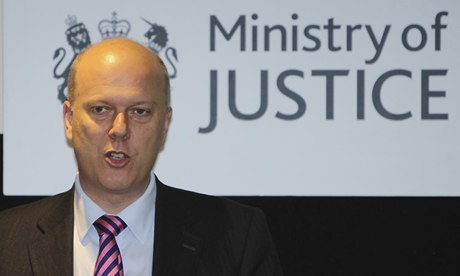Derbyshire, Leicestershire and Warwickshire trusts warn the rush to privatisation could have deadly consequences

Justice secretary Chris Grayling has
speeded up the privatisation timetable proposed by his predecessor, Kenneth
Clarke, so it will be done by the next general election. Photograph: Sean
Dempsey/PA
Three leading figures in
the probation service have warned the justice secretary, Chris Grayling, he
must delay his probation service privatisation plan
for at least six months or face inevitable protection failures and risks to
public safety, the Guardian has learned.
Robin Verso, the Warwickshire probation trust chairman, has told the Tory minister that the risks involved in the current timetable for outsourcing 70% of the probation service's workload are unacceptable: "Our assessment is that performance is bound to be damaged and that public protection failures will inevitably increase."
Gillian Wilmott, the chair of the Derbyshire probation trust, spelled out her fears that the fragmentation of the probation service would lead to "more systemic risks and more preventable serious attacks and deaths".
Jane Wilson, chair of the Leicestershire and Rutland probation trust, told Grayling that the current timetable, which includes imposing a deadline of April 2014 to transfer staff out of the public sector, was "unrealistic and unreasonable" and has "serious implications for service delivery and therefore increases the risk to public safety".
Under the justice secretary's proposed timetable, probation trusts in England and Wales will be abolished and the supervision of 225,000 low- and medium-risk offenders transferred to "community rehabilitation companies" on a payment-by-results basis by next October. A much smaller national probation service will manage 31,000 high-risk offenders and public protection cases.
Grayling has accelerated
the original timetable set down by his predecessor, Kenneth Clarke, to ensure
his probation reforms are in place before the 2015 general election. He has also
made clear that G4S and Serco will both
be able to bid for the £450m contracts despite the fraud inquiries under way
in their current Ministry of Justice contracts. Grayling has asked the Serious
Fraud Office to investigate G4S and subjected Serco to a forensic audit after it
emerged they had been billing the MoJ for tracking the movements of offenders
who had gone abroad, been returned to jail or even died.
The Leicestershire and Warwickshire probation trusts have called on Grayling to delay the timetable by at least six months. Wilson said that in the "view of senior professionals that even with additional administrative resource" there was "insufficient time to ensure the safe and robust transfer of all cases. Offender managers will be required to manage the transfer of cases on top of their existing busy workloads whilst at the same time, their managers and the management structure will also be changing." She says there have already been serious delays in providing basic information such as data on staffing.
The shadow justice secretary, Sadiq Khan, said the three letters were evidence that those who really know and understand the probation services were warning the government that their plans were not only half-baked but were being rushed through at breakneck speed.
"The government must heed this advice, go back to the drawing board, and at the very least test their plans in one area," Khan said. "What is Chris Grayling scared of? We need to have confidence the new plans will work before the government jump in with both feet and roll out nationally.
"The experts are understandably concerned about plans for what happens to serious and violent offenders released into communities up and down the country. We cannot afford to take risks with public safety."
But the MoJ defended the reforms: "These changes were widely consulted on and two pilots, in Peterborough and Doncaster, are showing encouraging falls in reoffending rates. We will continue to work closely with key stakeholders, including probation trusts, as we deliver our reform.
"Around 600,000 crimes are committed each year by people who have already broken the law, and almost half those released from prison have returned to crime within 12 months. The public deserves better which is why we are introducing these important reforms. Our changes will mean for the first time every offender leaving prison spends at least 12 months under supervision, where currently around 50,000 are released with no statutory support."
The probation service union Napo said 80% of its members had voted for next week's strike on a turnout of 46%, with 7,500 workers affected. It would only be the fourth time that Napo members had gone on strike, the union said.
Guardian